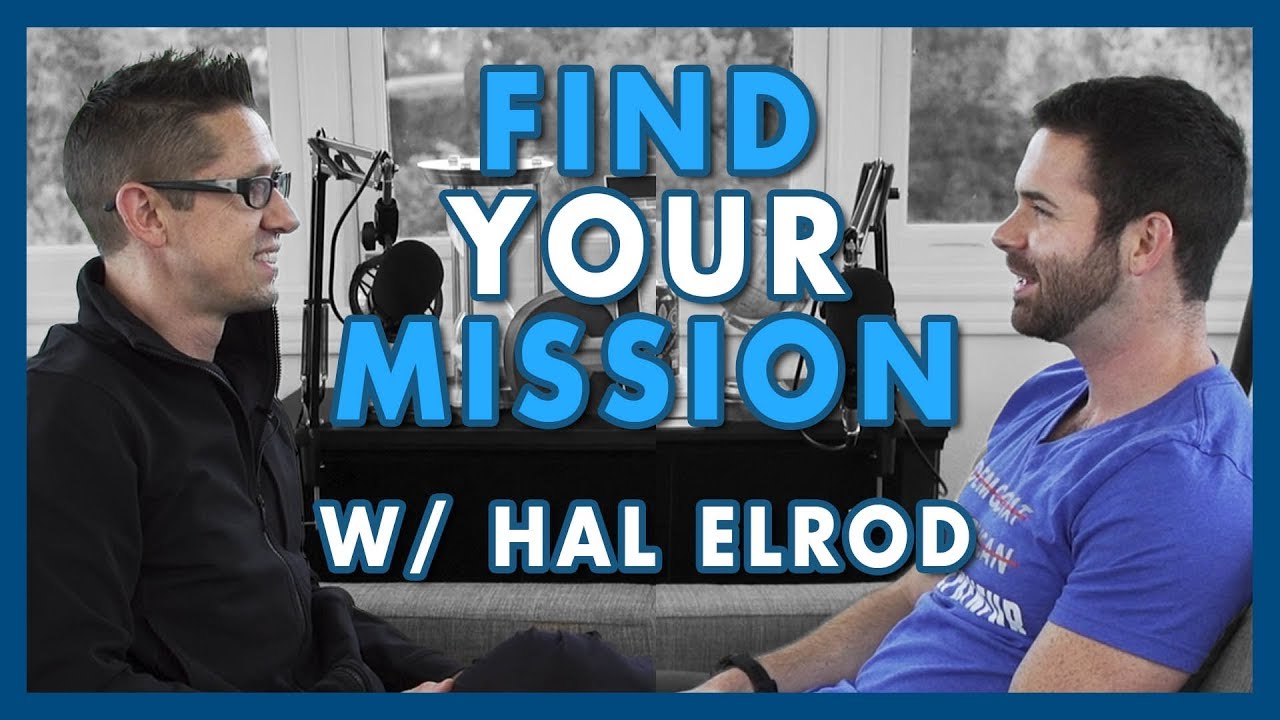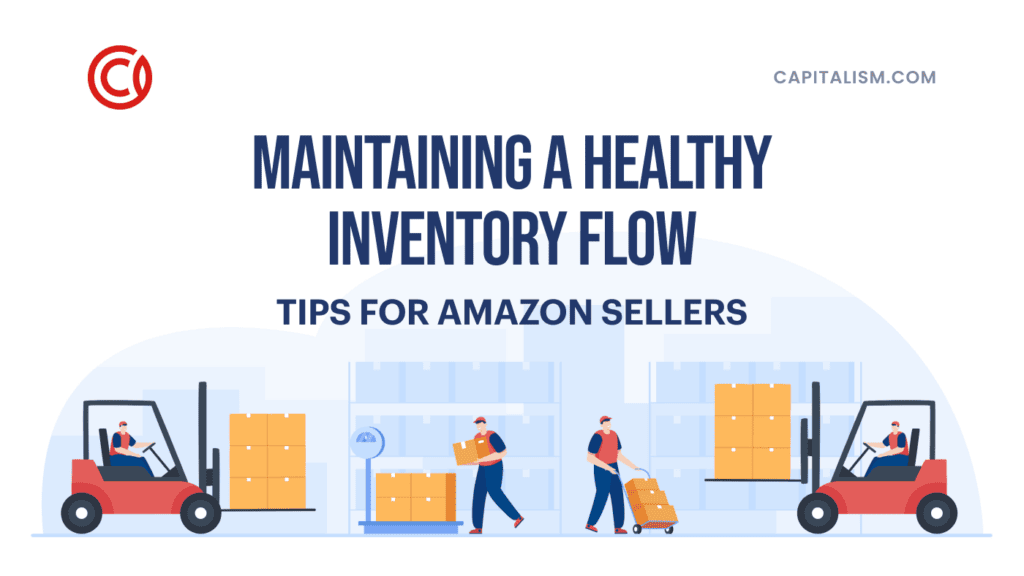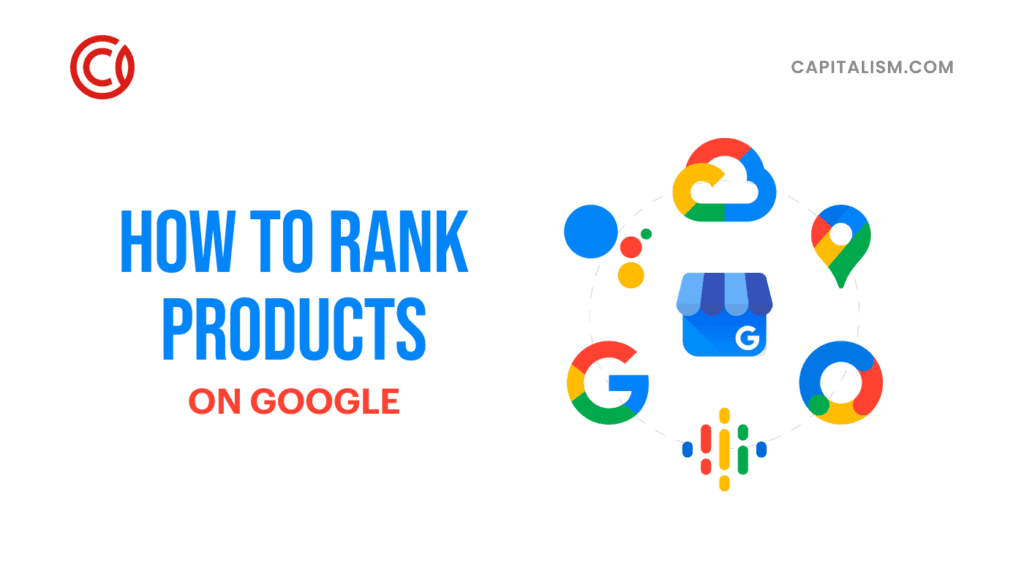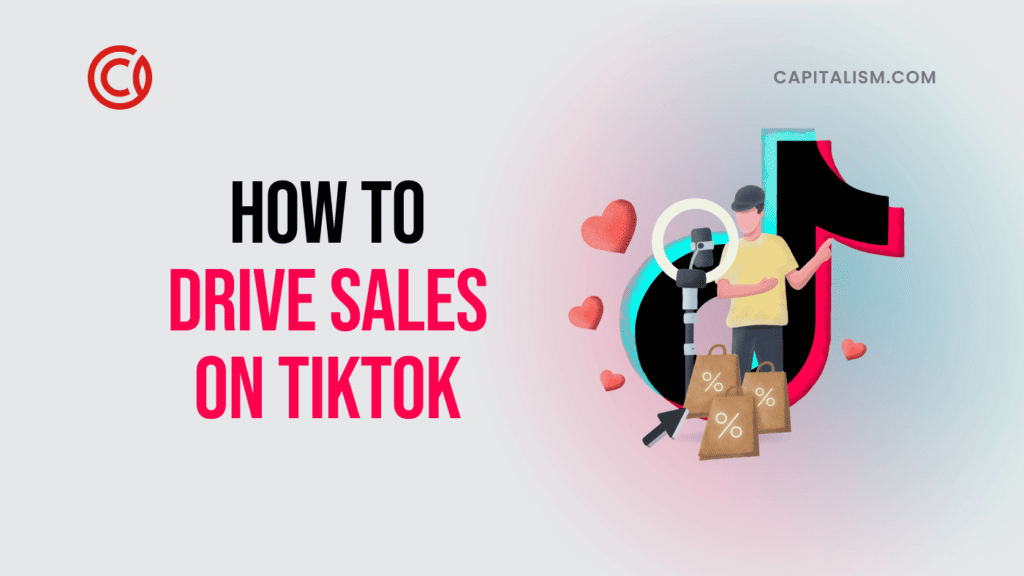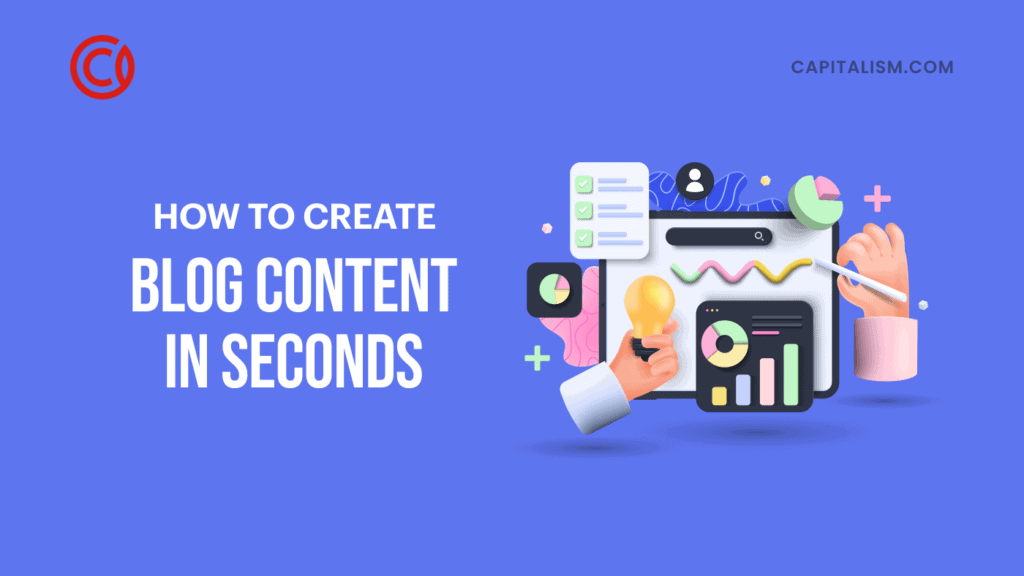Many entrepreneurs say their biggest startup problem is funding but there’s actually another saboteur silently thwarting your business.
How many of you sit down to work but… Your brain feels foggy. You stare at the screen. And 5 minutes later, you decide it’s hopeless and pull out your phone? Let the scrolling commence.
Poor focus is getting in the way of growing your business.
And it sucks because you want to help your target customer. To test your innovative ideas. But you just can’t slip into that groove long enough to make any meaningful progress.
So many entrepreneur articles teach you how to build a business empire but neglect to cover the engine that powers its growth: intense focus.
And it’s concerning. Because we’re forgetting how to focus intensely in an economy where we need it most.
Why Learning How to Focus (for Entrepreneurs) Is Required in Today’s Economy
Here at Capitalism.com, we believe entrepreneurship is how we pave a better future. We empower businesses that take people’s problems and solve them.
And there’s no better time to start. The internet makes entrepreneurship accessible now more than ever. If you have a laptop and a wi-fi connection, you can learn how to start an online business.
But you need to learn how to stay focused when starting a business. Author of Deep Work Cal Newport says there are:
“Two Core Abilities for Thriving in the New Economy 1. The ability to quickly master hard things. 2. The ability to produce at an elite level, in terms of both quality and speed.”
Building a business is hard. But building a business that performs at an elite level that:
- Drives tons of traffic
- Generates tons of revenue
- Attracts tons of loyal followers
It requires patience, dedication, and focus. Without focus, your business will suffer. But focusing is getting more challenging everyday.
The Attention Deficit
We are deeply attached to technology and social media. Doesn’t it feel good when you get a like on Instagram or a follow on Twitter? How about using an app that has somebody deliver your McDonald’s order? So convenient!
Technology revolutionizes our lives BUT it comes at a price:
- Technology makes things easier. BUT we’re more resistant to struggle (we get lazy).
- Instant gratification feels good BUT now we expect things immediately (we lose patience).
Our attention spans are declining and we can no longer access into what Cal Newport calls deep work: “the ability to focus without distraction on a cognitively demanding task.”
The Spoils Go to the Victor Who Focuses
Building a business is no joke. It’s not something you can achieve when the next shiny thing is constantly competing for your attention. It’s a growing problem: how do you stay focused without getting distracted? But those who conquer their distractions, embrace the struggle, and cultivate patience will thrive in this economy.
Focusing can be broken down into:
- How intensely you focus
- How long you can focus
When you focus deeply and for long stretches of time, you enter what Mihaly Csikszentmihalyi calls flow:
“Flow is being completely involved in an activity for its own sake. The ego falls away. Time flies. Every action, movement, and thought follows inevitably from the previous one”
Flow is where you want to be. Work becomes pleasurable. Ideas spring from the cosmos. And your business slowly manifests from your vision.
Remember: success is granted to those who focus.

7 Productivity Distractions That Are Killing Your Work
We want to focus deeply but how do we do it? Start with cutting out what’s killing your focus, therefore sabotaging your business:
1. You’re married to your inbox.
A Forbes article says office workers spend nearly 2.5 hours of their day checking email. This might be you. In line at Starbucks. Every 5 minutes at work. When you wake up. Before you sleep. You and those office workers could learn how to focus better at work if you limited your email access.
Try this instead: Designate 1-2 hours a day solely for checking email. If it’s an emergency, people will find another way to reach you (usually by calling).
2. Perfectionism.
Believe it or not: perfectionism can be a bad thing. Author of Work the System Sam Carpenter advocates optimizing your business systems only up to 98%. Anything beyond that offers diminishing returns.
Try this instead: Get comfortable with good enough. Optimize to 98% and focus your efforts on another part of your business that needs your attention.
3. Curate your to-do lists
Overflowing to-do lists: a universally familiar struggle. When tasks pile up, where do you even start?
Try this instead: list only the tasks that meaningfully advance your business. Focusing isn’t about getting things done. It’s about getting the RIGHT things done. Check out the video below where Hal Elrod and Ryan Moran discuss how to make your accomplishing your goals inevitable by focusing on the right things.
4. Learning from too many experts.
More knowledge = better, right? Surprisingly, not always. Here’s why: there are tons of experts offering conflicting advice. One expert says you need Facebook ads. Another says Facebook’s algorithms are messed up. Who do you trust?
Try this instead: commit to one expert, one mentor, one strategy. Chances are that everything has the potential to work but if you hop from advice to advice, you and your business will get nowhere.
5. Overloading with projects.
We want to be nice and helpful but sometimes we overburden ourselves. Juggling multiple projects might mean more gets done, but risks subpar quality.
Try this instead: learn to say no. We often take on more than we can handle because we’re people-pleasers. Practice saying no so you can give your current projects your full attention. Remember that focus requires depth over breadth. Focus deeply before expanding.
6. Burning the midnight oil.
Staying up past midnight to meet a deadline. Guzzling your fourth cup of coffee. Pushing yourself to the limit. This isn’t sustainable. You need sleep to consolidate your memory, improve your focus, and stir the creative well.
Try this: Create an evening routine that prepares your brain and body for sleep. Stick with it and soon falling asleep will be like brushing your teeth. Automatic.
7. You and your phone need space.
Distraction is always a reach and swipe away. When you sleep. In your pocket. On the counter as you shower.
Try this: create some space between you and your phone. Literally. When it’s time to sit down and focus, put your phone on silent in another room.
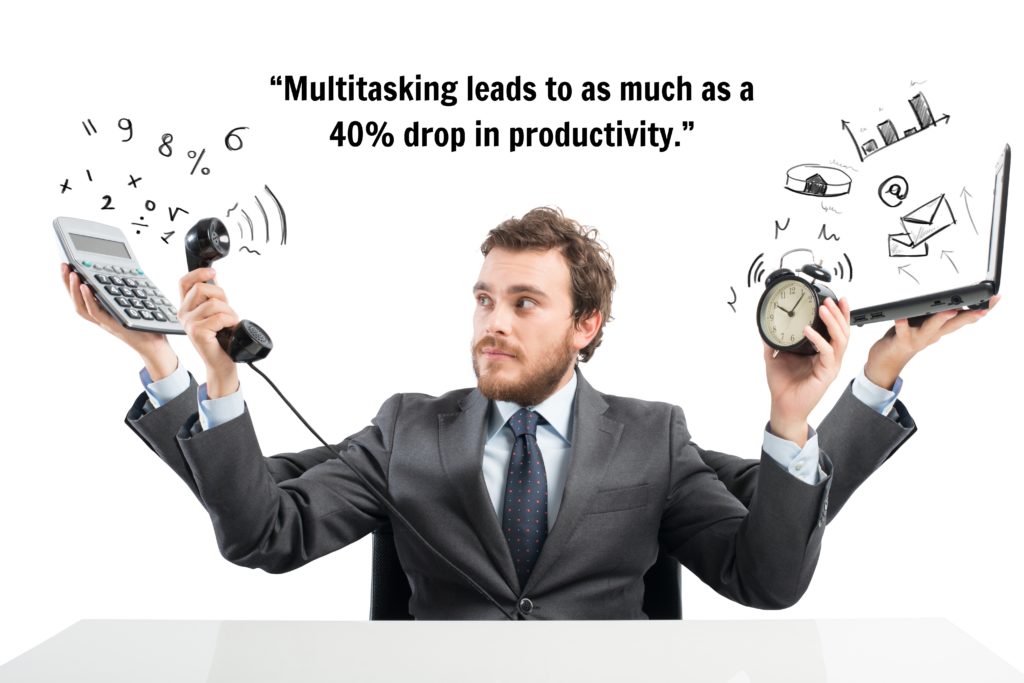
The Greatest Myth of All: Multitasking
Multitasking. Some of you do it. Some say you’re exceptional at it. A skill to be admired. But what about this?
Every time you switch tasks, there’s a cost. You spend extra time and energy re-acquainting yourself with each task. For example, if you’re writing a proposal and interrupt yourself (or “multi-task”) to email a client, you spend a few moments figuring out where you were when you return to your proposal.
Multitasking also promotes a (possibly) unethical work tactic: dividing your attention among several things. After all, who wants to receive a product or service that received only a fraction of your attention.
Entrepreneurs focus on one thing at a time. Because how can you expect to create the ultimate product or service unless you’re giving your full attention?
Effective focus is more a sniper rifle than a shotgun. High quality work demands the precision and attention of a sniper rifle. When you scatter your focus like a shotgun shot, you open too many opportunities for sub-par work quality.
Multitasking is the bane of laser-like focus. Learn how to focus your mind and how to focus right now with mono-tasking. Mono-tasking is the road to deep work and building your business to the heights you dream of.
Ditch the Disguise: Busy-ness vs. Productivity
If you cleared your inbox, created the perfect work setup, and did your morning affirmations, that’s awesome.
But if you didn’t cold email those 10 prospects and didn’t create your online retail store, then what you did earlier is not so great.
Clearing your inbox and perfecting your work space can be useful but it’s not productive. You stayed busy and ignored the important stuff that will advance your business
Don’t put a disguise on busy-ness and call it productivity. If you want to know the secret to how can an entrepreneur become more productive, identify what’s important and focus your time and energy on getting those things done first.
Staying busy should not be admired. But making the critical moves that grow your business? That’s your key to a successful business.
Boring Routines Are How to Stay Focused As An Entrepreneur
When people imagine being an entrepreneur, they imagine a perfect scenario: you wake up whenever you want. Your business is thriving. Total financial freedom. Life is good.
Truth is: entrepreneurship is none of that (at least starting out). You can use your business to design the life you want but it’s not easy and it’s not always exciting. You might be disappointed to hear that many days are spent following boring routines in a grinding process.
But that’s how success happens.
Best-selling author Stephen King says he writes six pages everyday. Every morning, he makes a cup of tea, plays his music, and sits in the same spot to crank those pages out.
How do you stay focused as an entrepreneur?
Follow Stephen King’s example. Create a morning routine (or evening) that you follow everyday to help you focus. If you’re a new entrepreneur and starting a side hustle, dedicate your evenings to working on your business.
No BS. No excuses. Build your focus and commit to the grind, even if you’re tired or bored or uninspired.
Outsourcing: Your Kryptonite is Another’s Superpower
It’s impossible to be great at everything. Nor should you strive to be.
Entrepreneurs understand that a business is a collection of inter-working parts. You might be good at managing certain parts. Other parts you struggle with.
Instead of obsessing over your weaknesses, start hiring and outsourcing. If you’re struggling with Amazon, hire a team of Amazon specialists. If you don’t know how to design, hire a graphic designer to bring your brand to life with compelling visuals.
Being a great business leader means hiring people who are more skilled than you in areas you lack. Somebody who writes copy for living will produce superior results than if you attempted it yourself.
When your weaknesses are covered, you can capitalize on the parts you know you’re great at.
YOU are the master of the chessboard. Learn how to assign pieces and position them to create a million dollar brand.
Todd Herman Doesn’t Have Long-Term Goals and Neither Should You
Todd Herman is a leader in peak performance. Instead of having a 5 year plan recommends breaking your goals into 90 day sprints.
Why 90 days? Because it’s still far out but immediate enough to know that today has an impact.
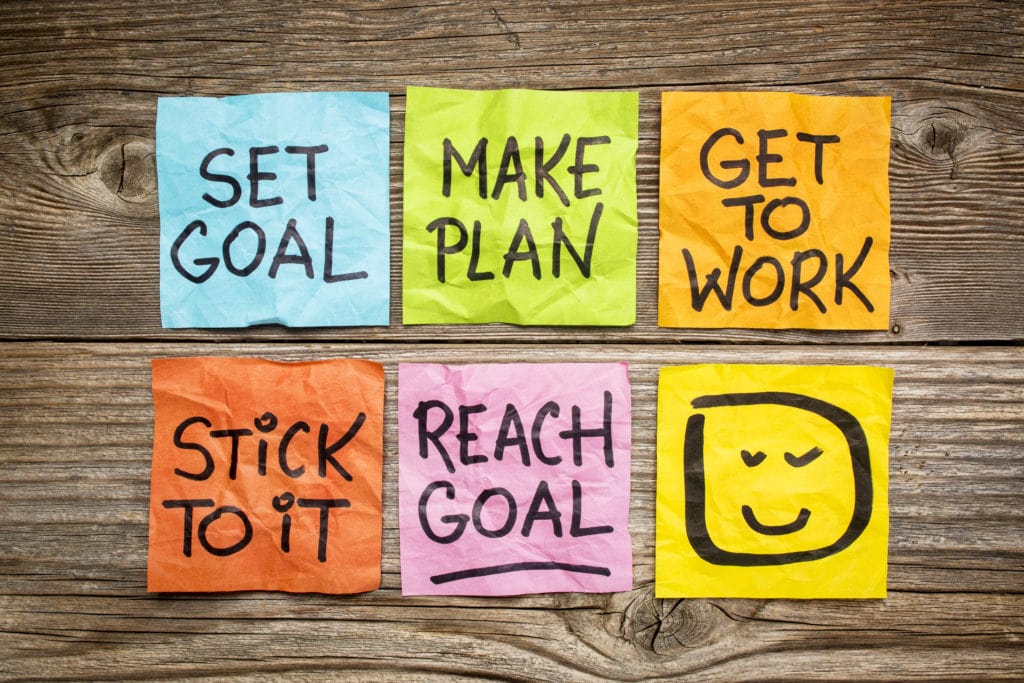
Outcome Goals vs. Process Goals
Your 90 day goal is your outcome goal:
- In 90 days, I will double my revenue
- In 90 days, I will triple my email list size
But it isn’t enough to just have a goal. You need to define how you will achieve that goal. That’s why within those 90 days, you also have two-week process goals:
- Everyday over the next two weeks, I will launch a Facebook ad campaign to drive traffic to our sales funnel.
- Everyday over the next two weeks, I will cold email five influencers to share this informative article.
Outcome goals are important for direction. But process goals are what you’re focusing on everyday. Process goals dictate how you spend your time. They are the brick and mortar to growing your business.
Set outcome goals but focus your time and energy on your process goals.
Capture Your Thoughts
Have you ever had a brilliant idea or a nagging reminder in the middle of working? You set your work aside to get it done. You order that item off Amazon or text your friend to confirm lunch for tomorrow. But wait, now you’ve broken your concentration.
Instead of losing focus, have a method for catching your thoughts so you can get back to it AFTER you’ve finished working. The solution is usually a to-do list.
But maybe writing isn’t your thing. Worry not! There are tons of task apps out there:
- Wunderlist
- Evernote
- Google Tasks
- Any.do
- Todoist
- And more
Test them out and use what works for you.
Want to Skyrocket Your Productivity? Try These 17 Hacks
Productivity hacks aren’t a one-size fits all. How do entrepreneurs stay focused? They try them all, then discard what sucks and keep what works.
1. Pomodoro
The Pomodoro technique is a focus technique that works in intense, productive bursts. Here’s what it looks like:
- Identify ONE task to complete
- Set a timer for 25-45 minutes
- Work only accomplishing only that ONE task
- Take a 5-10 minute break
This is one Pomodoro. After four sessions, you can take a longer 30 minute break and repeat until you finish that ONE task. By increasing the length of each work session, you can slowly build your focus duration.
2. Time blocking
It’s difficult to focus when you’re unorganized. If you’re unsure of what to do next, your brain defaults to what’s easy: usually scrolling social media. Prevent this by adding structure to your day with labeled time blocks. A morning schedule might look like:
- 09:00-10:00: Work on email campaign to promote new product
- 10:00-10:30: Strategy session with team
- 10:30-11:30: Respond to emails
- 11:30-12:30: Review CTR stats on recent ad campaigns
Never let ambiguity sabotage your focus. Always know what you need to do and assign a time block for it.
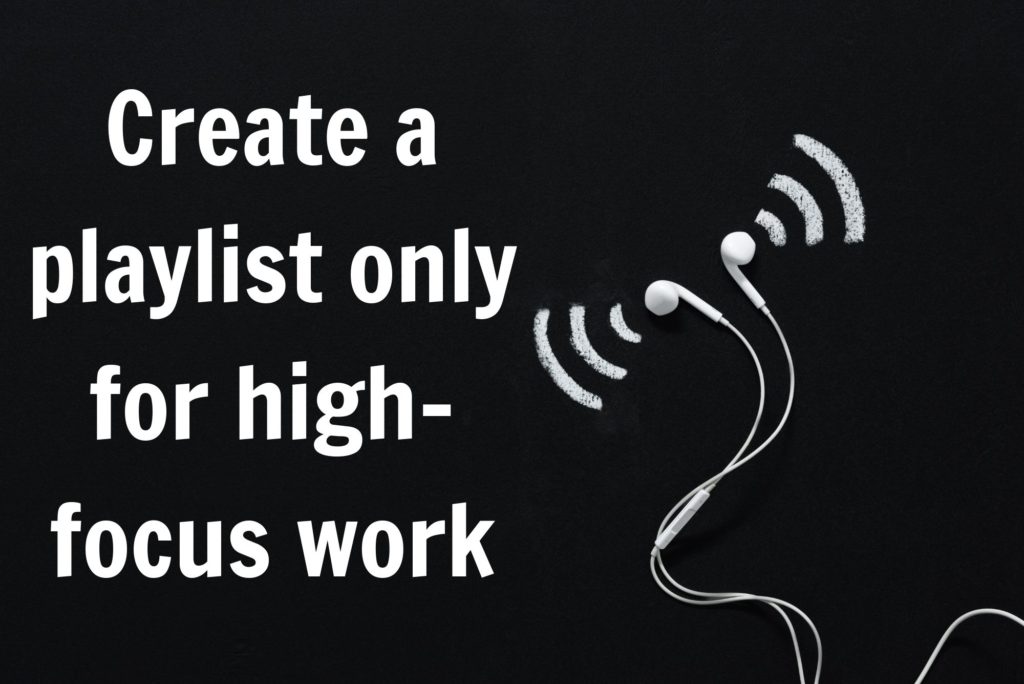
3. Listen to music
Some people swear by working with music. However, music with lyrics can be distracting. Instrumental music can set the backdrop on which your focus shines brightest. It can help you slip into that “ultra focus mode”. Our tip is to create music playlist dedicated only for high-focus work. Your brain will learn to associate that music playlist with being focusing.
4. Create an alter ego
Todd Herman helps athletes and entrepreneurs reach peak performance through alter-egos. If an athlete struggles with confidence on the field, Herman helps them craft a badass persona they can channel when it’s time to perform.
Do the same for yourself by using an artifact to trigger that persona. It can be a hat, or a watch, anything. When you put it on, you channel the person of business-minded entrepreneur who is ultra-focused and gets results.
5. Marie Kondo your schedule
Marie Kondo helps people declutter their spaces. Use her philosophy to declutter your schedule.
Are you taking too many pointless meetings? Are you spending too much time in your email inbox? Look at your schedule and be critical with yourself. Can you cut things out or streamline things so you could focus your time and energy on more important high-ROI tasks?
6. Review and reflect
It’s hard to think ABOUT your business when you’re always IN your business. Remember to leave the trenches and ask yourself, “How can I focus my business to solve my customers problems?”
Evaluate whether the work you’re doing is high-value with a solid ROI. Taking a step back might help you realize that you need to stop doing something or take a different direction.
7. Make your goals bite-size
Big goals help you grow but they can feel overwhelming. Don’t just add “start a business” to your to-do list. Break it down into smaller, specific tasks like:
- Buy the domain
- Brainstorm product ideas
- Create a unique brand
- Find manufacturer/supplier
8. Train your body, train your brain
We already know exercise is good for us but here’s why it’s helpful for focusing:
- Increased energy - You need energy to work
- Increased focus - You need focus to stay working
- Improved mood - You need endorphins to enjoy working
Exercise can become your philosopher’s stone to unlock the focus you need to get work done.

9. Put your phone away
Just as a recovering alcoholic would remove alcohol from their home, so should the focused entrepreneur remove distractions from their workplace. For most, that means your phone. Put your phone in another room while you perform high-focus work.
10. Eat the frog
Remember that really important thing you should have done last week but you keep procrastinating? Thanh Pham at Asian Efficiency gets it and he recommends you just eat the frog. The means getting it done first thing in the morning.
Leave no room for procrastination to weasel its way into your day.
11. Celebrate your victories
Entrepreneurs are often hard on themselves: My achievements aren’t enough. I could’ve done better. But victories, even small ones, deserve to be celebrated. Acknowledging your wins might be the motivation you need to stay focused when powering through the grind.
12. Self-care is the best care
How do you expect to offer the best service to your clients when you’re sleep-deprived, malnourished, and burned out? Before solving the world’s problems, focus on yourself. Eat healthier. Exercise more. Because you have more to give when you’re in good shape.
13. Keep your blinders on
Former professional basketball player Bill Bradley taped cardboard to the bottom of his glasses to practice dribbling without looking. This freed his attention to observe his environment and opponents.
Be like Bill Bradley and put on your own set of blinders. Many entrepreneurs ask themselves: How can I force myself to focus? The answer is to make it as easy as possible. Create a work space that is conducive to focusing and goal completion. Put your phone on DND. Leave only what is relevant to getting your work done.
14. Frequently revisit your company’s goals and mission statement
Sometimes we can go astray with our business. Under Apple, Steve Job’s mission statement was “to make a contribution to the world by making tools for the mind that advance humankind.” Some might argue that Apple products are no longer as innovative as they once were. It’s important to continuously revisit your mission statement to ensure you’re focusing on work that aligns with your vision.
15. Create thinking time
Like our bodies, our brain goes into modes of work, play, and rest. But sometimes your best thoughts come when you’re not actively working. Like when you’re showing or driving. Give yourself some space just for thinking. Go for a walk or meditate to unclog the creative pipe and get your best ideas flowing.
16. Chase opportunities, but be selective
Entrepreneurs are always looking to seize opportunities. But not every opportunity is golden. Don’t chase every shiny object that catches your eye. Take a moment, pause, and focus deeply on what’s best for your business
17. Progress reports aren’t just for school
Request regular progress reports from your employee to ensure your team is focusing. This can improve accountability and helps everybody meet their deadlines.
And now I pass the torch to you.
Let’s keep the productivity train going—what’s your favorite tactic for focusing?
Remember: We’re a community of entrepreneurs helping each other out. We encourage each other to build businesses that solve problems and improve lives.
And we achieve that by being active in your community and by being a focus machine in solitude.
Remember that focusing deeply:
- Helps you think deeply about how to build your business
- Maximizes your work output
- Identifies the key moves advance your business
You received the focus tools you need to grow your business to a million dollar brand. Now it’s time to get the work done.

